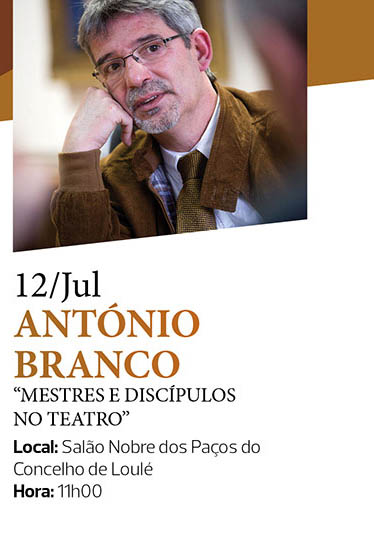 The rector of the University of Algarve António Branco will close the cycle of conferences “Masters and Disciples in the Arts, Sciences and Humanities”, at 11:00 am on July 12, at the Salão Nobre dos Paços do Concelho, in Loulé, with the theme “Masters and Disciples in Theater”.
The rector of the University of Algarve António Branco will close the cycle of conferences “Masters and Disciples in the Arts, Sciences and Humanities”, at 11:00 am on July 12, at the Salão Nobre dos Paços do Concelho, in Loulé, with the theme “Masters and Disciples in Theater”.
The conference, with free entry, grants a certificate of attendance.
The History of Theatre, especially from the end of the century. XIX, is full of examples of great actors and directors who, in their public testimonies, refer with great devotion to the role that Mestre had in his education and in the choices (Artistic and Philosophical) more decisive for the path that, from then on, started to go through.
In many of these testimonies, the Master appears as such a powerful figure in the disciple's life that he is able to provoke in him an epiphany of lasting effect, totally transforming the artist's life from the moment the meeting takes place. Therefore, this meeting often assumes, in the words the disciples use to describe it, a transcendent nature, creating in them the need to pass on to others the legacy received from the Master.
As a result of this urgency, some of these disciples later became teachers of other disciples, thus creating a sequence of historically identifiable individuals who, together, were what I call a "lineage."
Some concrete examples of this phenomenon will be presented and analyzed based on historical, anthropological, semiotic and artistic criteria, seeking to define some patterns common to many of these historically identifiable lineages in the history of theater in the century. XX.
This cycle of conferences was held within the scope of the Masters in Communication, Culture and Arts at the University of Algarve, in partnership with the Center for Research in Arts and Communication (CIAC) and the Municipality of Loulé.
It sought to launch a reflection on the way in which the transmission of knowledge operates through the definition and sedimentation of lineages in different areas of knowledge represented in the cycle (even those whose methodology is not, apparently, tangential).
Based on the approaches of guests such as José Mário Branco, Rui Sanches, Clara Pinto Correia, Pedro Ferré, among others, who shared their testimony about the process of transmission of knowledge, techniques, epistemological and artistic paradigms, in areas such as music , sculpture, biology, literature or theater, we sought to understand whether the definition of lineages consists of a transversal or universal phenomenon, or whether, on the contrary, the specificities of humanistic, scientific and artistic knowledge also generate autonomous mechanisms in the establishment of filiation relationships between masters and disciples.


















Comments